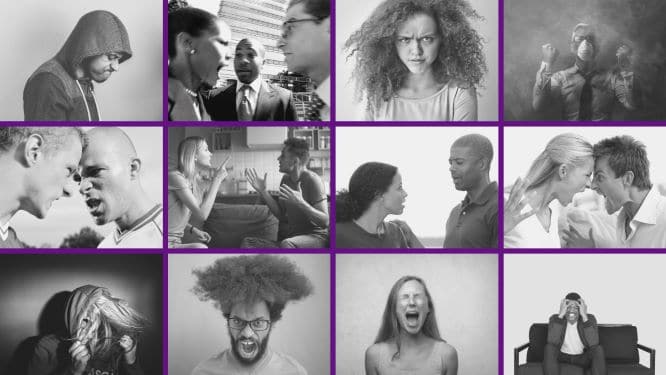
Mike Veny is a workplace mental health speaker. Learn more about his programs here.
I’ll let you in on a secret. When I started the plans for this blog post, I wanted to start off heated. I wanted to get everyone riled up. I wanted all of you to be able to see and feel how all the topics of the country right now have us on the verge of fighting. My plan was to help make it real for you to understand the negative impact of the tension we’re dealing with this year regardless of what side of the fight you fall on. And then quickly switch to talking about how to find a place of calm in the midst of it.
But in light of the past two weeks, I don’t need to do that. In fact, I feel it would be wrong to purposefully say a bunch of things to throw fuel on your fire in order to help you see my point. We’re all already seeing it every day in the media, in our neighborhoods, and in our conversations. We’re feeling it as we interact in conversations with those who don’t see our side or think the same way we do.
We are a nation that is tense and triggered.
And I’m not just talking about racism, even thought that’s enough on its own. It’s differing opinions on politics. Or if we should be wearing masks or not. It’s the daily decisions of others and events that are happening around the country that each one of us feels we have no control over.
I can assure you that everyone reading this doesn’t feel the same way about all of the controversial conversations that are happening right now. But I can also tell you that most of you reading this are dealing with tension. You feel stressed. Maybe a little scared. Unsure of what the future holds. Possibly even a little hopeless.
We don’t need to fight with each other.
There have been multiple times where I’ve heard from people reading my blog posts that I should take a side. Many of my posts stay in the middle when it comes to the diversity conversation. I try to help people see the perspective from both minority and majority viewpoints. As a black man, that’s not always popular with people who look like me.
I’ve also been told that I should speak out more on my political views and other topics. If you’ve been following along with my blog posts or YouTube videos, you may notice I try to keep the focus on mental health even when talking about diversity and inclusion.
Hearing that I should start to be more vocal about my own opinions made sense at the time…a little.
But today, looking at all that is happening around our country and the world right now, I think we need more people meeting in the middle. We need fewer people jumping to one side or the other. We need less tension and more teamwork.
When you stay on middle ground, you open the door for conversations that would never happen otherwise.
And this doesn’t mean that you don’t have opinions on all of the topics that are being discussed. But it means you CHOOSE to listen more than speak. It means you find a way to approach these tense topics from a place of calm.
So, I’m going to keep being “Mike Veny: Mental Health Speaker”, while addressing what the country and world are facing right now. Because that’s what I believe we need.
I’m going to use my voice today to share some tips that EVERYONE can use to diffuse conflict during this historically tense and triggered time. No matter what side you fall on.
How to diffuse conflict Q & A
Q: How can I keep myself centered during chaotic and tense times?
I believe there are many ways to center yourself. For me what tends to work is remembering to PAUSE.
Sometimes in life, when we have a lot going on, we don’t take that time to stop and pause. We’re triggered.
Even though we’ve been dealing with quarantines, social distancing, and self-isolation, many of us still haven’t had a chance to pause and get quiet for a minute. In fact, it’s not part of our culture. We live in a society that thrives on being constantly busy and distracted.
This is one of the reasons that I meditate.
You don’t have to meditate if you’re not comfortable with it. But I encourage you to at least pause, get some silence, and essentially don’t think. Give yourself space to be calm.
If you’re interested in more information on meditating, here are some resources:
Q: How can I avoid responding in anger?
I believe one of the best ways that we can avoid reacting and responding in anger is to think about the purpose of the conversation. Here’s an example:
I recently had a conversation with my content director. I expected to have differing views as we talked through direction, deadlines, obstacles, and all the specifics. That’s what was needed. I also knew that I needed to be ready to give a lot of information. She had created and sent an agenda before the meeting and we both knew what to expect.
Now, if we had started to talk casually during the conversation and got off topic on politics and she went off on one side, I’d have to stop, think, and reestablish what the purpose was of the conversation. Is it just that she wants to be heard? If so, what would be the point of me putting out an opposing point of view and getting angry? It wouldn’t change the way she felt or what she thought.
Remember, when you’re in a conversation with someone else, you don’t have to make it about you. The trouble starts when we:
- feel the need to be right
- think we need to try to “win” the conversation
- believe it’s our job to make the other person see they’re wrong
But if we approach conversations with the mindset of being ready to listen and understand the real reason behind the conversation, it will go a long way.
Q: How do I know when I’m starting to cross the line in a conversation?
Knowing when you’re crossing the line all comes down to self-awareness. And self-awareness comes back to learning how to center yourself. When you make that a habit, it becomes a part of you. You become more aware of things.
Pause right now and be silent for a minute. You’ll be more aware of the things around you and within you.
As you get better at self-awareness, you start to notice your reactions and how your mood or fear influences your conversations. A lot of the heated conversations that are happening right now are caused by fear. People are going into conversations angry and afraid, even if they don’t realize it.
Part of overcoming this goes back to understanding why you’re having the conversation.
Q: How can I have a conversation with someone I disagree with?
Here’s the thing, we need to stop focusing so much on what we disagree about and look for the things that we have in common. Most people I know, I completely disagree with. But I purposefully look for the things that we have in common. That’s the key to building relationships.
All of the relationships that you have right now started with some kind of common ground. For example, when you were in elementary school, you may have made friends with people because you sat at the same table in the classroom. You shared some type of common ground.
Right now, more than ever, I think it’s important that we try to find the common ground.
Q: How do I know when my mental health is being negatively impacted in a conversation?
When trying to protect your mental health, it’s important to notice the feelings that come up for you after you’ve had conversations with people.
When I walk away from some conversations, I feel uplifted. Other conversations I walk away feeling drained. Paying attention to this will help you see how and when you need to protect your mental health.
Let me be clear, I don’t think that we can label people as “toxic”. But I believe that there are conversations that can be toxic. And some people might be toxic for you. There are people who just aren’t going to be a good fit for you. There are some people you might need to love from far away.
It’s not always possible to have conversations with others. I think when we become more intentional about that, we also become more secure in ourselves.
Conversation tips
1. Approach conversations with curiosity
If I ask you a question about racism or politics, I’m not looking to make you see something from my perspective. I’m asking you about your opinion.
A lot of people approach conversations from their own point of view. For example, when it comes to gun control, they may be purely focused on thinking that “No one is going to take my guns away. It’s protected in the Constitution.” They approach the conversation focused on convincing others to adapt their viewpoint.
But I think we need to do the opposite. We need to approach conversations with the curiosity that says, “Can you tell me your point of view on this topic? I want to understand you. I want to understand what you’ve lived through and what you’ve experienced.”
When we do that, we create a bridge with people. I believe that’s one of the reasons why I’m able to have conversations with people across the board on different topics and from different viewpoints. I’m just going in with the curiosity of trying to understand their perspective. And it’s fantastic for me because when someone shares something with me that I don’t agree with, it’s an opportunity to think about it from another angle. Then smile and say, “Wow. I never would have thought of that.”
2. Stop venting
I don’t believe in it. Sometimes you need to share what’s on your mind. I get that. But venting makes someone your punching bag. They just have to sit and listen as you word vomit a one-sided conversation that’s usually filled with hate and anger.
If you feel that you need to “vent”, then I recommend you set some boundaries around it. For example, you could say, “I just need thirty seconds to complain and then I’m done.” And then stick to your time frame.
3. Discover your role in the conversation
There are multiple types of roles that you can play in a conversation. Understanding what your role is in any given situation can make a big difference in changing how successful the conversation is.
For example, if you’re telling me about a point of view that you have on something and I don’t agree, is my role supposed to be to correct you? I don’t think so. Instead, I think my role is to listen to you.
When you listen to someone’s point of view without judging them and trying to sway their opinion, you open up the conversation for them to ask you for your opinion. This is a more effective way to discuss controversial topics compared to trying to force your opinion or viewpoint on others.
4. Ask this question: How are you holding up?
There is a lot of tension in the world today. People are upset about a lot of things. Ask the people in your life how they are. See them as people instead of focusing on what side they fall on regarding politics or race or COVID rules.
Approach conversations from the humanity level. It’s not as much about the subject matter as it is about being present for people.
Keep an eye on your mental health and emotional wellness
Here’s the bottom line: I care about you. Regardless of who you vote for in November, if you wear a mask or not, and what color your skin is, I care about you. And I care about your mental health during this incredibly difficult time.
I know that people are afraid right now. And I wish I could have a hotline running 24/7 for you to call and express your true feelings and concerns without fear of judgement or criticism. But since I can’t, here are some resources that I encourage you to check out to help keep yourself emotionally well throughout the year:
- Online course: How to Find Peace in Times of Uncertainty
- Transforming Stigma: How to Become a Mental Wellness Superhero
- List of hotlines and resources: Where to Find Mental Health Help IMMEDIATELY
As you have difficult conversations in the coming days and weeks, I encourage you to work on self-awareness. See what feelings are coming up for you and explore why you feel that way. Real change will come as we overcome this tense and triggered state.


